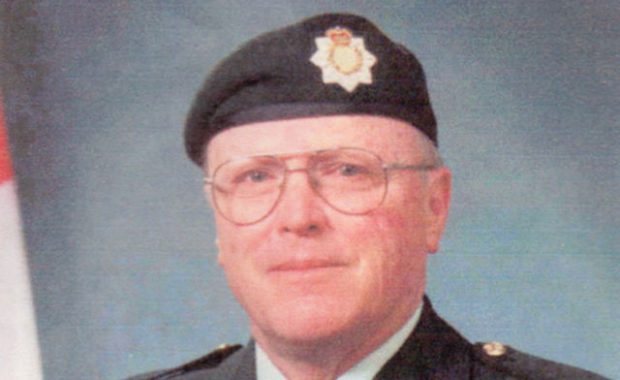BARRY’S BAY – “War has changed,” Jack Ogelsby, a veteran of the Korean War said. “It’s messy.”
The Barry’s Bay resident remembers many things about the war, some of which he wishes to forget. But when he stands on Remembrance Day, he reflects on all of those memories, all of those lives.
His life revolved around war from a very young age, with his father leaving the country in order to join the Black Watch Regiment.
“My life has been involved in the military, so I remember a lot of things,” he said. “My dad left home in 1939 to go to Montreal to join the Black Watch, which was a Montreal Scottish Regiment. I am the only kid in my class; I’m the only kid in the neighbourhood whose dad has gone to war.”
That was until several months later when most of them were needed as well.
“It lasted four months. It was different. When you’re eight years old, you are not sure what is going on. They don’t tell you anything, and I knew the war was on,” Ogelsby exclaimed. “I was well aware looking at pictures and so forth that there was a war on.”
His father returned a year later in February of 1940. He had a wounded knee, but carried a handful of badges and militaria with him.
The US Navy was in need of personnel, so they once again took his father, giving him the position as a quartermaster of the LSM 134.
It was attacked on the beach of Okinawa, and four of his father’s shipmates did not make it home.
When his father returned home once and for all, he was different. With Ogelsby’s four uncles at his side, they came back in one piece physically, but were severely suffering from Post Traumatic Stress Disorder (PTSD).
In 1950, the Korean War began and the US had not yet gotten their hands dirty, but it wouldn’t belong before they did.
Ogelsby signed up for the US Marine Corps in 1951. This was his way of avoiding being forced into the US Army.
“There’s a war on. It was a choice between conscription into the US Army or joining a force that you want,” Ogelsby said.
There are many things about the war that Ogelsby remembers, with the trenches being one of them.
“I remember Korea as a trench line running from the Commonwealth Division on our right to the Yellow Sea. It was
WWI except it had steep barren hills, devoid of trees blasted away from artillery and bombings,” Ogelsby said.
“There was lots of barbed wire, there were lots of mines.”
WWI except it had steep barren hills, devoid of trees blasted away from artillery and bombings,” Ogelsby said.
“There was lots of barbed wire, there were lots of mines.”
He was the platoon leader in the First Marine Division, with a unit on the right of the line tied in with the Australians.
“The battles ended on July 25, 1953. Today those hills are covered with timber and Seoul is a thriving metropolis. I have no desire to return to see the change,” he said.
In the year 1954, Ogelsby was sent to Japan with the Third Marine Division. They were put on a 48-hour standby in order to help the French who were quickly losing control over Indo-China.
“President Eisenhower, the US President at the time, was told that he would need a million Americans to defeat what became the enemy,” he said.
However, with minds changing, the soldiers were told to stand down. They instead protected 500,000 northerners who had chosen to huddle on the beaches outside of Hanoi/Haiphong.
The northerners were waiting on ships that would take them to a newly established non-communist South Vietnam.
In the summer of 1958, Ogelsby gave lectures at the University of Manitoba, he was unsure of whether or not he would be able to finish the course, due to the ongoing discussion of sending in the Reserve unit that Ogelsby commanded back in Seattle.
They were never needed, and Ogelsby was able to finish teaching his course at the university, and was never called upon again to join the throngs of war.
From there, he was sent home.
“Nineteen days on a troop ship, it was good. Everybody’s happy. It was nice to dock in San Diego; family was there, lots of families. It was nice,” he said with a smile. “I was happy to be home, but I didn’t dislike being overseas.”
“I came back with 4,000 people onboard ship. I shared a cabin with eight guys, some of whom I did not know. It’s different, it’s a different kind of situation,” he added.
Ogelsby immigrated to Canada in the year 1961, bringing his wife Nancy and their daughter Susan with him.
The Canadian Military was still in need of Oglesby’s services and in 1978 he was asked to help train young militia soldiers for the Cold War.
“I did that until I reached age 55, that was in 1986, and in 2000 I was asked to come back as the Honorary Lieutenant Colonel of the Fourth Battalion, and help mentor young soldiers, most of whom, some of whom, went to Afghanistan,” Ogelsby said.
From there, Ogelsby began to direct the Regiment’s Oral History Program, which wanted to capture accounts of the wars that it had been involved in.
“We had two World War I veterans left,” Ogelsby said, adding that he interviewed them both.
One of the two veterans looked back and the first thing that popped into his head was the rats.
Story continues in the November 7, 2012 issue of The Valley Gazette.
